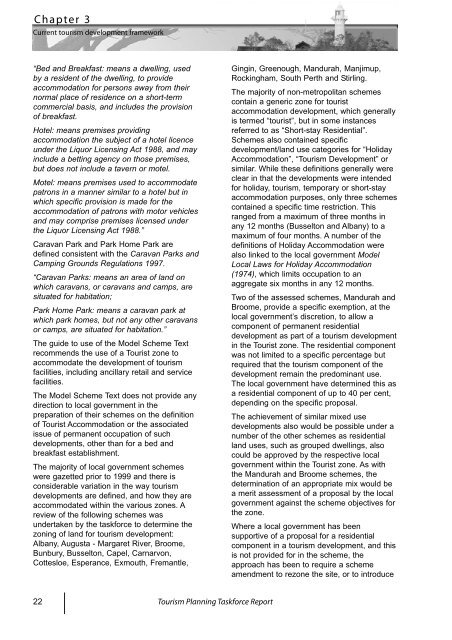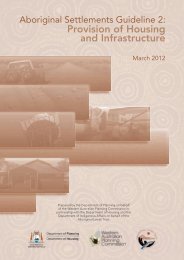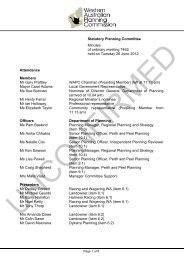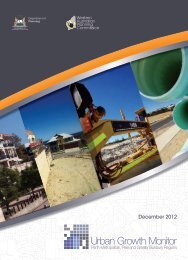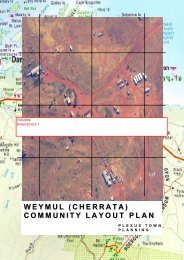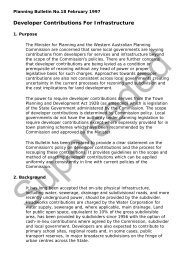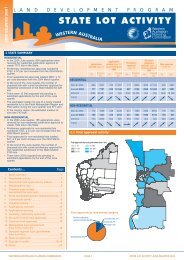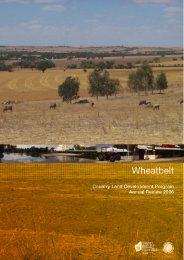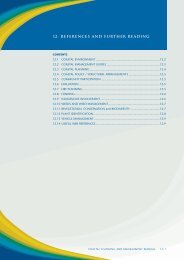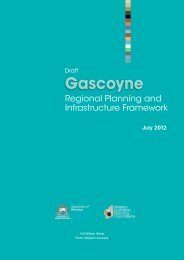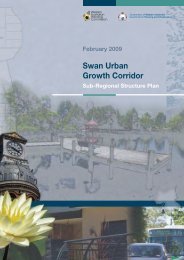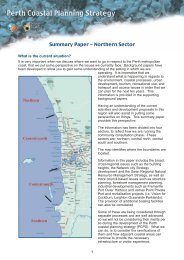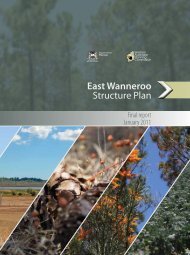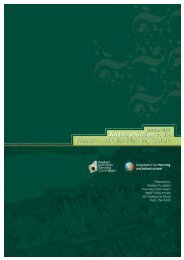Tourism Planning Taskforce Report - Western Australian Planning ...
Tourism Planning Taskforce Report - Western Australian Planning ...
Tourism Planning Taskforce Report - Western Australian Planning ...
- No tags were found...
You also want an ePaper? Increase the reach of your titles
YUMPU automatically turns print PDFs into web optimized ePapers that Google loves.
Chapter 3Current tourism development framework“Bed and Breakfast: means a dwelling, usedby a resident of the dwelling, to provideaccommodation for persons away from theirnormal place of residence on a short-termcommercial basis, and includes the provisionof breakfast.Hotel: means premises providingaccommodation the subject of a hotel licenceunder the Liquor Licensing Act 1988, and mayinclude a betting agency on those premises,but does not include a tavern or motel.Motel: means premises used to accommodatepatrons in a manner similar to a hotel but inwhich specific provision is made for theaccommodation of patrons with motor vehiclesand may comprise premises licensed underthe Liquor Licensing Act 1988.”Caravan Park and Park Home Park aredefined consistent with the Caravan Parks andCamping Grounds Regulations 1997.“Caravan Parks: means an area of land onwhich caravans, or caravans and camps, aresituated for habitation;Park Home Park: means a caravan park atwhich park homes, but not any other caravansor camps, are situated for habitation.”The guide to use of the Model Scheme Textrecommends the use of a Tourist zone toaccommodate the development of tourismfacilities, including ancillary retail and servicefacilities.The Model Scheme Text does not provide anydirection to local government in thepreparation of their schemes on the definitionof Tourist Accommodation or the associatedissue of permanent occupation of suchdevelopments, other than for a bed andbreakfast establishment.The majority of local government schemeswere gazetted prior to 1999 and there isconsiderable variation in the way tourismdevelopments are defined, and how they areaccommodated within the various zones. Areview of the following schemes wasundertaken by the taskforce to determine thezoning of land for tourism development:Albany, Augusta - Margaret River, Broome,Bunbury, Busselton, Capel, Carnarvon,Cottesloe, Esperance, Exmouth, Fremantle,Gingin, Greenough, Mandurah, Manjimup,Rockingham, South Perth and Stirling.The majority of non-metropolitan schemescontain a generic zone for touristaccommodation development, which generallyis termed “tourist”, but in some instancesreferred to as “Short-stay Residential”.Schemes also contained specificdevelopment/land use categories for “HolidayAccommodation”, “<strong>Tourism</strong> Development” orsimilar. While these definitions generally wereclear in that the developments were intendedfor holiday, tourism, temporary or short-stayaccommodation purposes, only three schemescontained a specific time restriction. Thisranged from a maximum of three months inany 12 months (Busselton and Albany) to amaximum of four months. A number of thedefinitions of Holiday Accommodation werealso linked to the local government ModelLocal Laws for Holiday Accommodation(1974), which limits occupation to anaggregate six months in any 12 months.Two of the assessed schemes, Mandurah andBroome, provide a specific exemption, at thelocal government’s discretion, to allow acomponent of permanent residentialdevelopment as part of a tourism developmentin the Tourist zone. The residential componentwas not limited to a specific percentage butrequired that the tourism component of thedevelopment remain the predominant use.The local government have determined this asa residential component of up to 40 per cent,depending on the specific proposal.The achievement of similar mixed usedevelopments also would be possible under anumber of the other schemes as residentialland uses, such as grouped dwellings, alsocould be approved by the respective localgovernment within the Tourist zone. As withthe Mandurah and Broome schemes, thedetermination of an appropriate mix would bea merit assessment of a proposal by the localgovernment against the scheme objectives forthe zone.Where a local government has beensupportive of a proposal for a residentialcomponent in a tourism development, and thisis not provided for in the scheme, theapproach has been to require a schemeamendment to rezone the site, or to introduce22 <strong>Tourism</strong> <strong>Planning</strong> <strong>Taskforce</strong> <strong>Report</strong>


